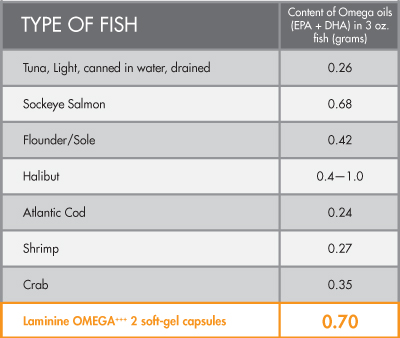



Heart disease in the United States represents a continuing crisis of epidemic proportions, with nearly 960,000 individuals dying from heart disease and stroke each year.1 The statistics show one out of four will have heart disease.
Of greater significance, many young adults with no clinical evidence of CVD have two or more risk factors that predispose them to subsequent clinical events and death over the course of several decades. In apparently healthy young people, these risk factors usually go unrecognized and untreated.2 Young people are not as inclined to eat much fish, regular or high omega-fatty fish.
Some types of fish contain high levels of mercury, PCBs (polychlorinated biphenyls), dioxins and other environmental contaminants. For instance, canned tuna is not recommended more than twice weekly, because of its mercury content.
The American Heart Association recommends eating fatty fish at least two times a week to obtain partial health benefits from omega-3s and omega-6s and recommends taking an omega supplement to reduce risk of heart disease. Many studies now indicate benefits of consuming one to four fish oil capsules per day.
The chart below shows the amount of EPA + DHA (omega-3 fatty acids) contained in a serving of various fish and shellfish. The daily use of a dietary supplement is the easiest and most logical solution. Laminine OMEGA+++ comes to the rescue with omega-3 fatty acids sourced exclusively from the Engraulis Ringens, a member of the anchovy family that has the highest occurring ratios of EPA and DHA of any fish species, from the pristine waters off the coast of Peru. LifePharm Global takes it a step further by purifying the fish oil to remove any possible contaminants.

According to the most recent statistics, if all forms of major CVD were eliminated, life expectancy would rise almost seven years.1 Many risk factors are modifiable, and compelling evidence indicates that a major proportion of the current CVD burden is either totally or partially preventable. Data from the Nurse’s Health Study, for example, suggest that women who maintain a desirable body weight, consume a healthy diet, exercise regularly, avoid smoking, and drink alcohol in moderation reduce their risk of CVD by 84 percent. Yet only 3 percent of the women studied followed these recommendations, which points to the need for more effective public health messages, and changes in the healthcare system that promote prevention.
Can Omega 3 Fatty Acid Supplementation Truly Support Heart Health?
In a recent survey, three quarters of the cardiologists who recommended supplements for heart health said that if they had to choose one dietary supplement to specifically support cardiovascular health, they would select omega-3 fatty acids. New research also supports their decision. A multi-ethnic study, published in the Journal of the American Heart Association, suggests that omega-3s not only reduce cardiac threats, but do so by as much as 51 percent.
The U.S and Canadian governments have now selected omega-3s as nutrients worthy of the in-depth review process for setting a Dietary Reference Intake (DRI). Up until now, neither the FDA nor the Institute of Medicine has gone through the elaborate process of establishing any nutrient content claims for DHA and EPA. It is good to know that our health organizations are going forward for particular nutritional ingredients now found to be effective towards heart health.
The largest study that first ascertained there could be a strong association for omega fatty acid supplementation was designed to evaluate 11,324 patients who were receiving conventional heart medication after experiencing a recent heart attack. The purpose of the study was to observe if fish oil supplementation could support the prevention of a second heart attack.
Two commonly overlooked secret weapons for heart health
The exceptional Laminine OMEGA+++ formula contains other ingredients that are also beneficial for heart health.
A study selected 244 healthy postmenopausal women to receive either placebo or vitamin K2 for three years. After three years of vitamin K2 supplementation, there was a 50 percent improvement in arterial health parameters compared to placebo. The researchers concluded that long-term use of vitamin K2 supplements improved arterial stiffness in healthy postmenopausal women, especially in women having a high arterial stiffness.6
Do you want to live long or risk premature death?
Common sense dictates that people of all ages should eat plenty of fresh fruit and vegetables, decrease consumption of hydrogenated fats and sugar, exercise regularly and get plenty of rest in order to maintain heart health and overall health. There is more than enough evidence that good behavior alone is not enough for many segments of the population, as heart disease continues to kill at a startling rate.
Laminine OMEGA+++ provides a simple and cost-effective way to supplement imperfect diets and promote heart health. The question is not "why take Laminine OMEGA+++" but "why wouldn’t anyone who loves life not take Laminine OMEGA+++?"
References: